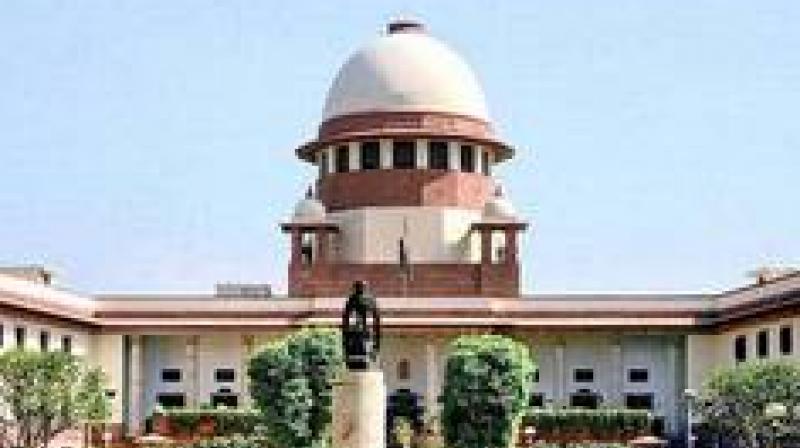Ex-CIC to SC: Police blocks roads, not Shaheen dadis

NEW DELHI: Former Chief Information Commissioner Wajahat Habibullah told the Supreme Court that the protest at Delhi’s Shaheen Bagh against the Citizenship (Amendment) Act (CAA) was peaceful and inconvenience being caused to commuters was due to barricades “unnecessarily” put by police on roads far away from the site.
The same stand has been taken by social activist Syed Bahadur Abbas Naqvi and Bhim Army chief Chandra Shekhar Azad in their joint affidavit filed in the apex court. Habibullah, Mr Azad and Mr Naqvi have jointly filed an intervention application in the top court which is seized of the matter.
Habibullah had visited the protest site at Shaheen Bagh pursuant to the direction by a bench of Justice S.K. Kaul and Justice K.M. Joseph. The bench is scheduled to hear the matter on Monday. The top court is hearing pleas seeking removal of protestors from Shaheen Bagh and ensuring smooth traffic flow in the area.
The Supreme Court had earlier said that though people have a fundamental right to protest “peacefully and lawfully”, it was troubled by the blocking of a public road at Shaheen Bagh as it might lead to a "chaotic situation".
Habbibullah said: “I noticed that there are numerous number of roads that have no connection with the protest that have been barricaded by the police unnecessarily, abdicating their responsibilities and duties and wrongly laying the blame on the protest. It is this barricading of unconnected roads that has led to a chaotic situation.” Former CIC Habbibullah also said the police should reveal the names of persons responsible for the decision to block the parallel and arterial roads in the area. The blockage of the road by protesters had become a key issue ahead of the Delhi Assembly elections, with the BJP blaming the protesters and accusing Chief Minister Arvind Kejriwal of encouraging them. “Feeding biryani to Shaheen Bagh” was how the BJP’s star campaigner and Uttar Pradesh Chief Minister Yogi Adityanath had put it. Habibullah said the protesters were not blocking school vans or ambulances as has been alleged by parties.
“I was informed that all ambulances and school vans that clear the police barricade after being found to be genuine by the police, are given immediate safe passage through the protest site,” he said in the affidavit.
Along with Habibullah, the court has also appointed senior advocates Sanjay Hegde and Sadhana Ramachandran as mediators. In his affidavit, Habibullah has contended that “Shaheen Bagh stands tall as a firm example of peaceful dignified dissent, more so in the face of various instances of state-sponsored violence on similar dissents across India. “We have been sad and mute witnesses to police brutality and negative typecasting of a particular community across the country. Crushing dissent instead of entering into a dialogue is the new norm, but it is alien to our Constitution,” he has claimed.
In their joint affidavit, Mr Naqvi and Mr Azad have alleged that "the pre-sent ruling dispensation, at the behest of its political masters, had devised a strategy of extinguishing these pro-tests by falsely attributing violence and acts of vandalism to peaceful protestors".
They have also said that police has “unnecessarily” barricaded numerous roads that “have no connection with the protest" and are at a great distance from the site, thereby, “abdicating their responsibilities and duties and wrongly laying the blame on the protest”.
“It is these barricading of unconnected roads that has led to a chaotic situation,” Habibullah claimed.
and added that if the barricades are removed from the 10 points he has mentioned in the affidavit, "the chaos complained of in the petition would cease".
In a separate affidavit, Naqvi and Azad have claimed the issue of inconvenience to commuters has been "deliberately orchestrated by the police" by blocking all the surrounding roads as well as the arterial roads connecting Delhi, Noida and Faridabad.
They have further alleged that one of the petitions has been filed by lawyer Amit Shani, who is an active member and supporter of BJP posing as a concerned citizen, as his place of residence, office and direct route of daily commute are nowhere near Shaheen Bagh.
Habibullah, in his affidavit, has also stated that the protestors have asked him to convey to the apex court that their dissent "was out of desperation and compulsion" as they see the CAA, National Population Register (NPR) and National Register of Citizens (NRC) as a "death knell" for their and future generations' survival and existence.
The other concerns voiced by the protesters were that CAA and the intention behind it, as publicly stated by those in power, "has struck a deep fear into the hearts of many poor and under-privileged citizens of India".
He has said, "The assembly is peaceful. The question of their security is also crucial. Any attempt to forcibly shift them from the present site would compromise their safety."
Restrictions have been imposed on the Kalindi Kunj-Shaheen Bagh stretch and the Okhla underpass, which were closed on December 15 last year due to protests against CAA and NRC.
The Supreme Court is hearing an appeal filed by Sahni, who had first approached the Delhi High Court seeking directions to Delhi Police to ensure smooth traffic flow on the Kalindi Kunj-Shaheen Bagh stretch, which was blocked by anti-CAA protesters on December 15 last year.
Separately, former BJP MLA Nand Kishore Garg has filed a plea in the apex court seeking directions to authorities to remove protesters from Shaheen Bagh.

